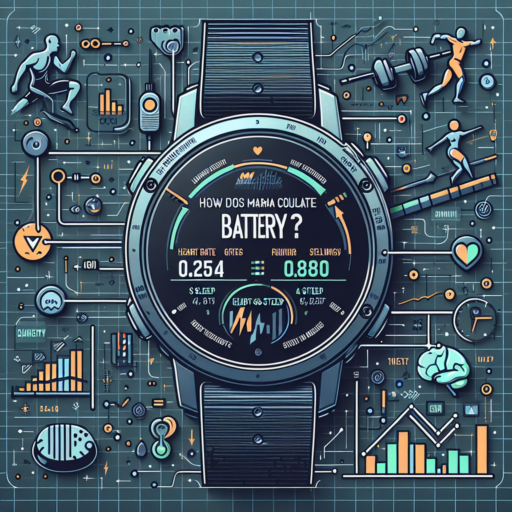How is the Garmin body battery determined?
The Garmin body battery is a unique health and wellness feature that provides users with insights into their body’s energy levels, helping them to manage their physical and mental resources more effectively. Determining the Garmin body battery involves a sophisticated blend of technology and physiological insights. At its core, the feature utilizes a combination of heart rate variability (HRV), stress levels, and activity data to calculate an individual’s energy reserves at any given moment.
HRV is a critical component in the calculation of the Garmin body battery. This measurement reflects the time variation between heartbeats, which can indicate the body’s stress and recovery status. A higher HRV suggests a relaxed state with more energy reserves, while a lower HRV indicates stress, fatigue, or overexertion. Garmin devices capture HRV data during periods of inactivity, especially during sleep, to assess how well the body recovers from the day’s activities.
Stress levels and physical activity play a significant role as well. Garmin devices measure stress based on the variability in heart rate data, distinguishing between restful times and periods of high stress. Simultaneously, the device tracks physical activity intensity and duration, providing a comprehensive picture of how daily activities deplete or conserve energy. By analyzing these elements in unison, the Garmin body battery offers a nuanced view of an individual’s energy levels, guiding them towards better rest, recovery, and activity planning.
How accurate is the body battery on Garmin?
The accuracy of the body battery feature on Garmin devices has been a topic of interest and discussion among fitness enthusiasts and professionals alike. Garmin’s body battery is designed to utilize heart rate variability (HRV), stress levels, and activity data to estimate the user’s overall energy levels throughout the day. This tool aims to help users optimize their daily activity and recovery times by understanding their body’s energy reserves.
One of the key aspects that affect the accuracy of Garmin’s body battery is the personalization of data. Over time, the device fine-tunes its predictions and insights based on the user’s specific habits, activities, and physiological responses. This means the longer you use your Garmin device, the more accurate the body battery readings become. The device’s ability to learn and adapt to the individual’s lifestyle plays a crucial role in the precision of these energy level estimations.
However, users should note that while the body battery feature offers valuable insights, it’s not without limitations. Factors such as the quality of heart rate data, the presence of external stressors not accounted for by the device, and irregularities in sleep patterns can influence the accuracy of the body battery readings. Users are encouraged to consider their own feelings of fatigue and energy alongside the device’s data for a comprehensive understanding of their body’s energy levels.
Why is my body battery so low on Garmin?
Understanding the Metrics Behind Your Garmin’s Body Battery
Garmin’s Body Battery is an innovative feature that tracks and combines various health metrics to estimate your body’s energy levels throughout the day. A low Body Battery score can be a cause for concern among users, indicating a potential imbalance between stress, recovery, and physical activity. It’s important to comprehend that factors such as physical exertion, stress, sleep quality, and even nutrition play a pivotal role in determining your body’s perceived energy levels.
Key Factors Affecting Your Body Battery Levels
Several aspects can contribute to a low Body Battery reading on your Garmin device. Firstly, poor sleep quality or insufficient sleep duration can significantly drain your energy, as this is the prime time for your body to recover. Secondly, elevated stress levels – whether physical or psychological – can also deplete your Body Battery. Engaging in intense physical activity without adequate rest, or even enduring mental stress without taking time to relax and recover, can impact your body’s energy state. Additionally, hydration and nutrition are often overlooked yet crucial factors; not consuming enough water or essential nutrients can leave your body feeling fatigued and thus, lower the Body Battery score.
Practical Tips to Improve Your Body Battery Score
Maintaining or improving your Garmin Body Battery score involves addressing the underlying factors contributing to its depletion. Ensuring a consistent sleep schedule and improving sleep quality can markedly benefit your body’s recovery process, thereby enhancing your energy levels. Similarly, incorporating regular, mild to moderate exercise can boost your Body Battery by promoting more efficient stress management and overall health. Moreover, never underestimate the power of hydration and balanced nutrition; these elements are fundamental in fueling your body adequately. By mindfully attending to these aspects, you can take meaningful steps towards optimizing your Body Battery and, by extension, your overall well-being.
No se han encontrado productos.
What is a good body battery on Garmin?
Understanding what constitutes a good body battery on Garmin is crucial for athletes, fitness enthusiasts, and anyone looking to optimize their daily energy levels. Garmin’s Body Battery™ energy monitoring feature measures your body’s energy reserves using a combination of heart rate variability (HRV), stress, sleep quality, and activity data. A higher score indicates a more significant amount of energy available, while a lower score suggests fatigue or a need for rest and recovery.
The Body Battery score ranges from 1 to 100, with values closer to 100 representing an optimal level of energy ready to be expended in physical activities or daily tasks. Generally, a score above 75 is considered good, indicating that your body is well-rested and prepared for either high-intensity workouts or sustained physical activities throughout the day. It reflects not only a sound night of sleep but also balanced stress levels and effective recovery periods.
It is essential to monitor patterns and trends in your Body Battery scores rather than focusing solely on daily readings. Observing how different activities, stress levels, and rest periods affect your scores can help tailor your lifestyle and activities to improve your overall energy reserves. Regularly maintaining a score within the higher range can signal good health, effective stress management, and optimal recovery practices.




